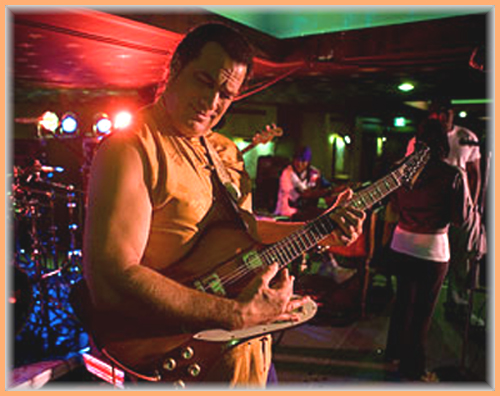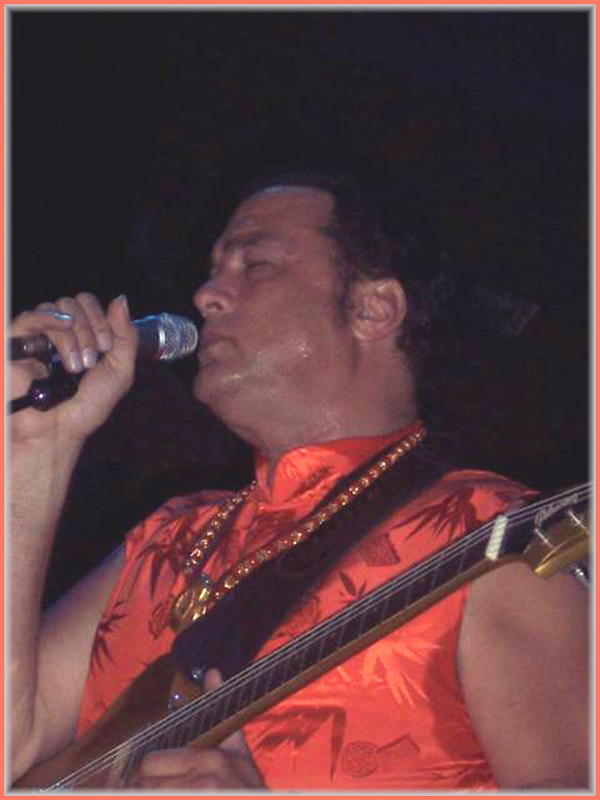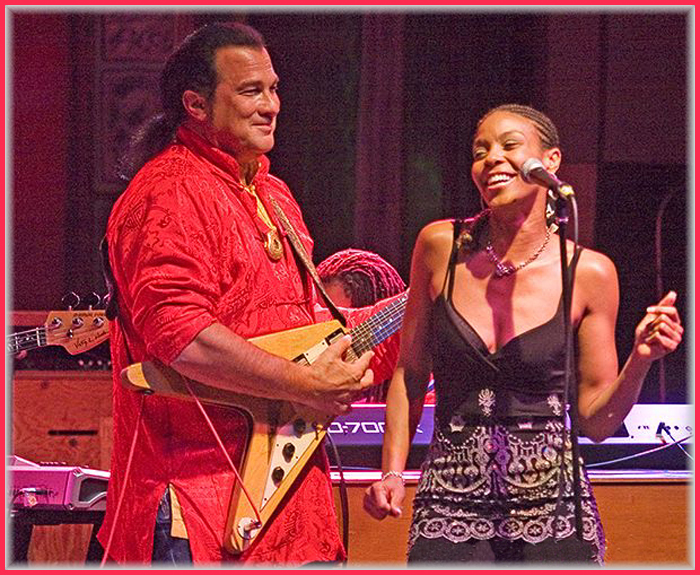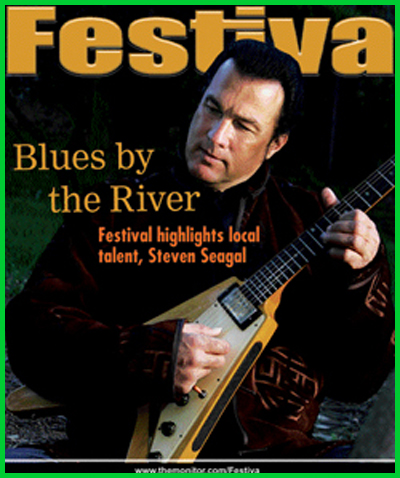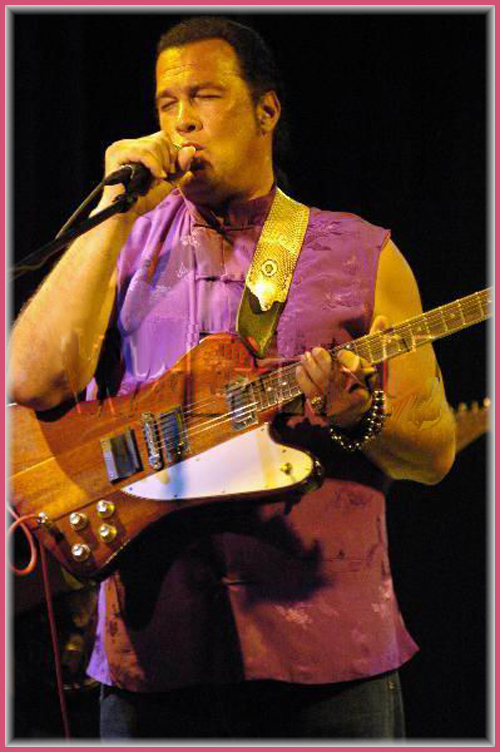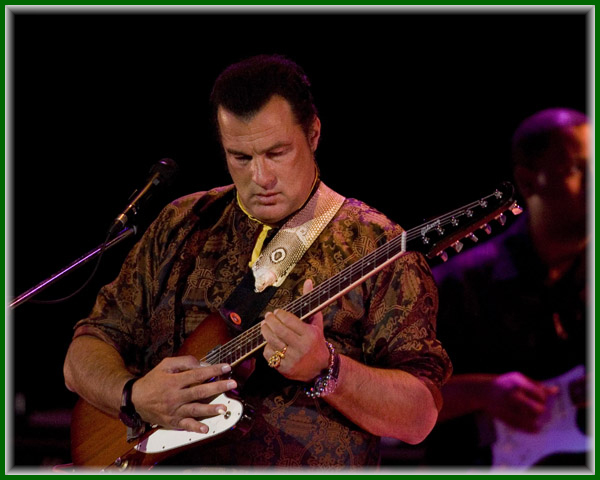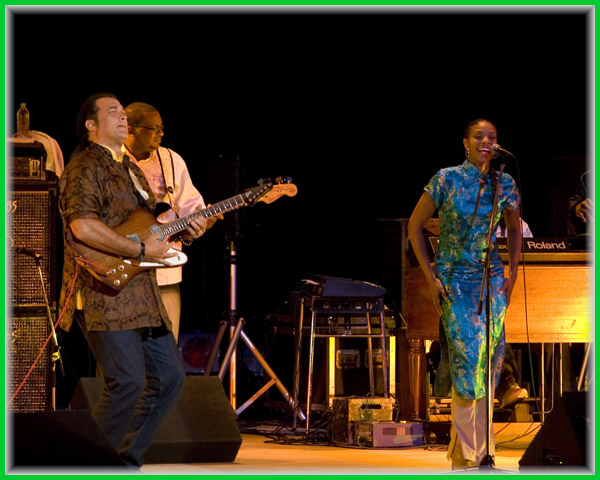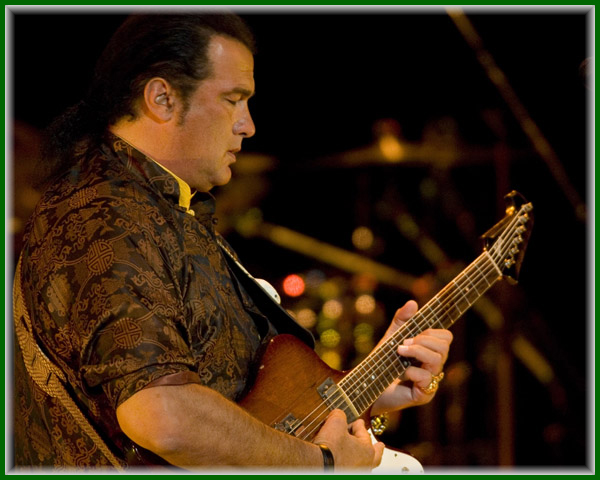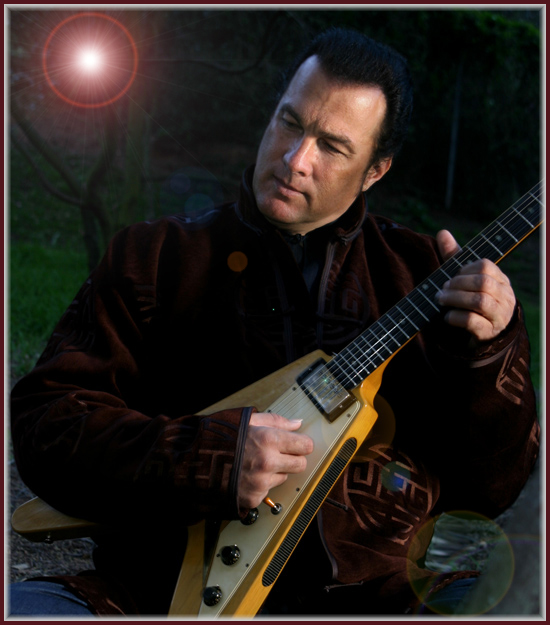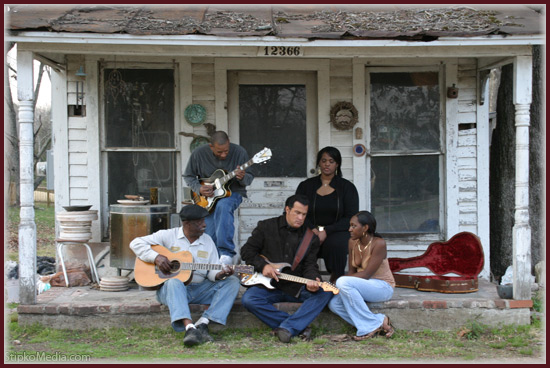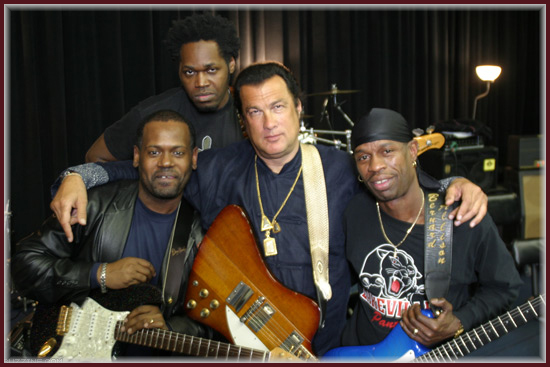|
|
In the realm of bad '80s action flicks, Seagal was the baddest -- a big, black-clad,
bona-fide martial-arts master who looked like he could break Arnold Schwarzenegger over his knee if he wanted to. In movies
like "Under Siege" and "Above the Law," it wasn't enough to merely beat up the bad guys -- he had to turn their attacks back
on them, break their bones, gouge out their eyes. He did it all with a cool -- even cold-blooded -- detached demeanor, snapping
necks with less care than Emeril snaps open oysters.
Now, he's back -- channeling some
unknown past life as a hard-bitten, hard-luck bluesman. He performs Tuesday night at the Rex Theatre on the South Side.
"It's been my first love. It's
what I've always done," Seagal says. "I'm just doing more of it now. "I was just raised in a neighborhood
where there were all these old black Delta musicians sitting on the porch. All of the South came into Detroit, to get out
of the cotton fields and the coal mines. I'd see them play, me and kids from the block. I just wanted to learn, y'know?" His previous career doesn't seem
to be detracting from his new gig.
"At the risk of sounding rude,
I've never had that problem," Seagal says. "People hear me play, they take it serious."
Seagal is a hard guy to nail down.
He's a devout Buddhist, vegetarian and animal rights activist, characteristics that seem to be at odds with his red-meat,
tough-guy public persona and difficult private life. Musician is another role that doesn't seem to fit.
"It's all me. I mean, I'm not a
tough guy, but I suppose I could try to be if I have to," he says. "I'm not here trying to see who's tougher. That's not something
I have time for."
Seagal can play guitar all right,
and his first blues album, "Mojo Priest," features legends like Bo Diddley, Pinetop Perkins, Hubert Sumlin and James Cotton
backing him up. With characteristic megalomania, he sings, plays lead and rhythm guitars and produces the entire album. It's a very slick, modern, over-produced
affair, which likely bears little resemblance to his live club show.
Seagal's voice, a chilly, clenched-teeth
monotone in the movies, warms into a deep, whispery croon on the album. It does sound like he's done this before.
Then again, he is a professional
actor. His commitment to his music seems genuine, though. His next film, "Prince of Pistols," is his first film to make this
clear.
"I am making a movie about the
blues, in July with Sony in Lousiana," Seagal says. "Hubert Sumlin is playing my father. A lot of the last living blues legends
are in the movie. It's a true story about something that happened in Louisiana. It's a dramatic movie."
Drama, sure -- but it's a mistake
to ask if he throws any clobbering into his stage show to keep it fresh.
"How could I kick (expletive) at
a concert? Really? Is that a serious question?" Seagal replies.
Finding out it was a question asked
in fun, Seagal says: "Forgive me, I just wasn't quick enough for your 'humor.'"
So don't joke around with Steven
Seagal.
Michael Machosky can be reached
at mmachosky@tribweb.com or (412) 320-7901
Steven Seagal had little to say about his upcoming
performance here Saturday, but his music packs a powerful punch. The high-octane action movie star, with movie
credits such as Above the Law, Under Siege and Hard to Kill is also a blues musician (he had planned on a music career long
before Hollywood came knocking on his door). He’ll demonstrate his talent at the 2nd annual Blues by the River Festival
at Pepe’s On The River, where he’ll perform numbers from his new album, Mojo Priest. The festival begins at 5 p.m. and includes performances
by Clueless, Kingpin, Jake Cortez and Lock N Load. Seagal will close the show. Seagal said he had no ambitions of a movie career
when he was a child; he started playing the guitar at about age 5. While growing up in Detroit, he had extensive exposure
to blues musicians who had immigrated to the Michigan city from the steel mills of the deep South. “They were the blues,” he said in
a distinctly bluesy tone of voice. He often spoke so quietly he was difficult to understand; he had no real answer about what
drew him to the blues as opposed to other types of music. “That’s like asking, ‘Why
do I prefer purple instead of green?’ ” said Seagal, who bills himself as Steven Seagal and Thunderbox. The veteran actor/musician/martial artist’s
deep baritone voice shows a well-developed sensitivity to the blues genre, and he plays a mean guitar accompanied by some
electrifying drum and synthesizer. David Martinez, a lead guitarist for Lock N
Load, felt “excited and privileged” about Seagal’s appearance. “I have his CD,” Martinez said.
“I was listening to it this morning. His guitar playing is actually good. He has a very gravelly voice which lends itself
to the blues style. It’s very well-produced. He had some excellent guest artists, such as Bo Diddley.” Diddley won’t be with Seagal on Saturday
night, nor will many of the other guest artists on his album. However, he has a very large band with him, including a powerful
female background singer who lends some electrifying vocals that impress Martinez. Seagal wrote most of the songs on Mojo Priest,
except for a few cover pieces such as Muddy Waters’ “Hoochie Coochie Man.” “His songs are very good, very well crafted,”
Martinez said. “The things he talks about I think are in the style of Delta blues.” Seagal’s music also surprised Jake Cortez,
who will also perform Saturday. “I didn’t even know he played guitar,”
Cortez said. “I heard some of his music on his Web site, and his playing is good. To me it sounded kind of like bluesy
Stevie Ray Vaughan, from what I heard.” Cortez, who played the New Orleans Jazz and
Heritage Festival in 2003, appreciated the opportunity to perform at a blues festival, the first time he has received such
an invitation in the Rio Grande Valley. The local musician, who is pushing 30, produced
an album several years ago of his own music and is currently working on a follow-up of more original work. He’s also
preparing an album of traditional Mexican music. However, he’s best known for playing flamenco and blues music. “I am starting to accept the fact that
I am a Gypsy blues man,” he said. “I kind of disguise the blues. You kind of have to disguise it a little bit.
I love Latin jazz, I throw some horn in there, some congas.” Martinez and Seagal actually have two common
interests: blues and aikido, a form of martial arts in which Seagal has received advanced accreditation and has used in his
movies. Martinez has also studied aikido. “For me it’s a double privilege,”
the elder Martinez said.
Beady of eye and pony of tail,
martial arts master, energy-drink entrepreneur and Germantown newcomer Steven Seagal kicked, bone-snapped, Adam's apple-crushed,
butcher knife-stabbed and pool cue-impaled his way through some of the most profitable action movies of the 1980s and '90s
-- movies with dramatic "Steven Seagal is (fill in the blank)" titles made to order for the basso profundo narrator of each
film's trailer: "Steven Seagal is... 'Above the Law.'" "Steven Seagal is... 'Hard to Kill.'" "Steven Seagal is... 'Out for
Justice.'" And so on. In other words, Steven Seagal don't
play. But when he does play, he plays the blues, both on record and on stage. Seagal -- who sings and plays guitar
-- and his band, Thunderbox, are in the midst of a 16-city national tour that brings them to Beale Street's New Daisy Theatre
for an all-ages show Wednesday night. Doors open at 7; tickets are $20 in advance or $22 at the door. "Emotionally and spiritually, it'll
be powerful, because almost the whole band is from Memphis," said Seagal, 55, who is regarded as a master of the Japanese
martial arts of aikido, kendo, judo and karate as well as (in some quarters) a tulku, a reincarnation of a Tibetan
Buddhist lama. "For us it's going to be very powerful, because this is the place we love."
The tour is in support of Seagal's
second album, Mojo Box, recorded last year at House of Blues and Sounds Unreel studios in Memphis and released May
23 on Seagal's Nonsolo Blues label.
The album includes cameos from
an astonishing lineup of rhythm and blues all-stars, including Bo Diddley, Ruth Brown, James Cotton, Koko Taylor, Louisiana
Red and David 'Honeyboy' Edwards, to name just a few. The veterans join Seagal on such chestnuts as Muddy Waters' "Hoochie
Coochie Man" and Elmore James' "Dust My Broom" as well as on such originals as "Talk to My Ass," "Gunfire in the Juke Joint"
and "Alligator Ass" ("Someone took me to a restaurant and I had to eat something fast/ I ordered me some chicken/ They gave
me alligator ass...").
The Thunderbox band includes such
seasoned players as Preston Shannon veterans Harold Smith on guitar and Norris Johnson on keybords; Edward 'Hot' Cleveland
on drums; Angel Rogers on backing vocals; Armand Sabal-Lecco on bass; and Bernard Allison -- Chicago-born son of the late
blues great Luther Allison -- on guitar.
"We don't do any fancy pyrotechnics
or any antics up there, we just do a good blues show," said the 6-foot-4 Seagal, in a telephone interview from California.
"So far, we've been real lucky. We've had some shows where we just burned the house down." (Metaphor- ically speaking, presumably
-- although considering what Seagal did to that train in "Under Siege 2," who knows?)
The tour has received respectful
reviews. "The Aikido master held his own," wrote Seattle Post-Intelligencer reporter Bill White. "He was having fun doing
something he loves... and the sold-out crowd loved every minute of it."
Seagal -- who bought a house in
Germantown two years ago and has been an active supporter of St. Jude Children's Research Hospital and a presence at such
local events as the "Hustle & Flow" premiere -- is no newcomer to music. Although he moved to Japan at 17 to study martial
arts, he grew up in the Detroit area, where he befriended many local blues musicians, he said.
"Music is my first love. I've been
playing it all my life -- I love it more than film, more than anything," said Seagal, in a voice even softer than the threateningly
low rasp he employed in such films as "Hard to Kill," in which he promised one supporting player: "I'm gonna take you to the
bank -- the blood bank."
Seagal said it wasn't easy to hone
his blues chops after he became more famous for his karate chops. "In the olden days, I used to wear a disguise, a total disguise,
and I'd come into a club and play. Believe it or not, I'd do it in such a way that people wouldn't recognize me. I'd play
on Beale Street and in Mississippi... I know it sounds crazy, but that's what I'd do."
Despite his Detroit roots and current
Memphis status, he cites "the Texas guys" -- Albert Collins, Clarence 'Gatemouth' Brown and Lightnin' Hopkins -- as particular
influences on his blues style. Asked if the discipline required to master a martial art was similar to that needed to become
a masterful musician, Seagal answered: "All art is the same. It's just different machinations of the same thing."
Seagal continues to star in action
movies with such titles as "Mercenary for Justice" and "Today You Die," most of which go direct to video. His most intriguing
upcoming role is in an as yet untitled movie produced by the staff of the satirical newspaper The Onion, in which he will
play a character called "Cock Puncher." He also markets his own beverage, Steven Seagal's Lightning Bolt, billed as "the first
energy drink made of 100 percent juice."
Seagal said he's not much of a
fan of today's theatrical action movies, in which actors such as Tom Cruise and Hugh Jackman routinely perform superhuman
feats with the aid of digital effects. "I kind of find most of that pretty ridiculous," he said. "I still kind of want to
keep my (action) realistic."
More info:
Steven Seagal and Thunderbox
All-ages show Wednesday at New
Daisy Theatre, 330 Beale.
Doors open at 7 p.m. Scottish singer-songwriter
J.J. Gilmour opens the show.
Tickets are $22 at the door or
$20 in advance at the New Daisy box office; at Cat's, Pop Tunes, Re-Play and Spin Street locations; online through newdaisy.com;
or by calling (800) 594-TIXX.
Martial arts master sings the blues, too BILL
HUTCHENS; The News Tribune
In general, the “triple threat” is someone with three
entertainment talents. If
you add Steven Seagal’s singing and guitar playing to his acting and butt-kicking – well, you’ve gotta call
him a quadruple threat. It’s
either that or risk taking the brunt of that last listed talent. Seagal,
who has starred in about two dozen action movies since 1988’s “Above the Law,” will bring his blues band,
Thunderbox, to Seattle’s Tractor Tavern as part of the first leg of the group’s Mojo Priest album tour. Earlier
this week, the actor/singer/guitarist/butt-kicker took a few minutes out of his busy schedule for a phone interview. Tell
me how you got started. You’ve been playing guitar forever, since you were a little boy, right? Yeah,
I started playing the blues when I was a little kid. People in my neighborhood were a lot of these old Delta Blues musicians,
and I learned from them. I kind of carried it with me. I always loved it. I’ve always been playing. Where did
you grow up? Detroit. Detroit,
OK. So you started by playing the blues? Yeah,
I did. That’s what I learned. And then later on, you know, as a kid you start to make bands and stuff. And the band
by then wanted to play rock ’n’ roll and I pretty much had only learned the blues, you know. And so I started
playing drums instead of guitar because of that difference. And then, you know, kind of later on went back to the blues and
forgot about rock ’n’ roll because I never liked it too much. Who were
some of your influences and your favorites? Howlin’
Wolf, Muddy Waters, Lighting Hopkins, Albert King, Albert Collins, Gatemouth Brown, B.B. King. Growing up
in that part of the country, you must have felt a kind of kinship with them. Well,
I’m lucky because I got to, you know, meet those guys and play with those guys and learn from those guys, a lot of those
guys, not all of them. So, I’m lucky. Any
memorable moments with any of those guys? Many.
Too many. Too many. Too many. You know, when Gatemouth Brown was alive, as you know he left us recently, whenever he came
to California he’d stay with me. This is a guy that Albert Collins learned from. A lot of great guys came out of Texas.
Half my family is out of Texas. Now, I’ve
heard that you are quite the accomplished guitar player. Nah,
man, I’m just a simple blues guitar player. I try not to play a lot of notes whenever I play with the blues legends.
There’s guys like Gatemouth and people like that, even B.B., if you can’t play, they’ll throw you off the
stage. I know I can play ’cause I’ve played with them guys a lot, they’ve loved my playing and given me
a lot of love and encouragement. So, I’m OK. … It ain’t about how many notes you can play, just about how
much you love the blues. What’s
your show going to be like? What can we expect? If
you love the blues, I think you’ll really like this show. It’ll be real traditional Delta Blues played by people
all from Delta, born and raised in the Delta, playing blues since they was little, you know? Do
you have ties to the Northwest? Do you have any friends/family up here? No,
I’m embarrassed to say, I don’t. (Laughs.) OK. Well,
you will after this weekend, I’m sure. That’s
right. (Laughs.) Are you ready?
Are you excited about it? Um,
as Muddy Waters said, I’m ready as anybody could be. (Laughs.) on
the NET Hear the entire Steven Seagal interview online. Bill Hutchens will guest-write at Ernest Jasmin’s Bring
the Noise blog at blog. thenewstribune.com/ej. Steven Seagal and Thunderbox in concert
When: 8 p.m.
Saturday Where: Tractor
Tavern, 5213 Ballard Ave. N.W., Seattle Tickets: Sold
out
STEVEN SEAGAL is good at everything. He's an activist. He's an action hero. He's a Buddhist.
He's—no, forget it, he's just good at everything. Including playing the blues! On Sunday he's coming to Dante's
with his Steven Seagal Blues Band (May 28, 8 pm, $20) and he's gonna rock you into the ground with songs off his new CD, Mojo
Priest. But the thing he's best at is talking to me. Yup—I interviewed Steven Seagal over
the phone recently and we hit it off like the Karate Kid and Miyagi. I think we might be best friends now—or at the
very least we'll probably shoot a buddy cop film together in the near future. I'm thinking of calling it Best Friends Who
Kill Everybody for Justice. Check out portlandmercury.com/podcasts for more of this interview. Mercury: What can people expect from the Steven Seagal live show? Steven Seagal: As a Buddhist I don't really like to expect anything. We [of] the Buddhist
path kind of consider that a recipe for disaster. You started playing music pretty early... You know, I grew up in an all-black neighborhood in Detroit where people had come from
the deep South to work in the steel mills. Everybody tried to get out of the cotton fields [of the South] and the coal mines
and all of them came into Detroit, along with, as you probably know, all the blues legends—Muddy Waters to Howlin' Wolf,
Al King to John Lee Hooker to BB King. I got to learn from the real cats. What's your favorite guitar for playing slide? Silvertone. Yeah, man, this morning first thing I did when I woke up was grab that old
Silvertone and start playing some bottle music. I'm just learning how to play slide and man, it's a whole different world. Can I tell you? Man, I have all these old anecdotes that I learned from the old blacks.
Can I tell you one of the things the old guy who taught me slide told me? He said something really interesting. He said, "you
know, depending on who gonna teach you, the white folk might say 'hey look, put the slide right here, and get the note like
that, but I'm gonna tell you something... you don't never play slide like that. You don't look at the fret. You don't look
at nothin', and you play slide by the sound, not by where the bottle is." I've been listening to your stuff and the blues that you play seems completely,
totally authentic. It don't get more authentic than that. Yeah, a lot of people play the blues and it's just—they just seem like a bunch
of honkies. Well, I don't mean to be rude, and even some of the famous cats—and I'm not going
to name names—learned from [listening to records.] Not me, I learned from the real cats and I grew up with the real
cats and I'm still living with the real cats. You met those cats just because you grew up around them? You know, the cat that's still alive who was Howlin' Wolf's guitar player, that's Hubert
Sumlin. In my opinion Hubert Sumlin is probably the most important living blues guitar player right now because he really
was with those cats and he can still play really great electric blues, and I'm always so honored when I play with him, and
he's also kinda like a father to me... Hubert is going to be playing my father in this movie called Prince of Pistols
that we're doing with Sony in Louisiana in July. Oh, whoa, he's going to be playing your father? Right, surrogate father, you know, someone who raised me up. Oh, okay. I was going to say, he's black, and you're white. Is it a movie about the
blues? Yeah. I mean, in my opinion, this will be the most important blues movie ever made,
and that's not to say someone won't make a better one, but up until now I will promise you this will be the most authentic
blues movie ever made. It's got a lot of great people in it and a great story. What's the premise of the movie? Well, it's kind of a true story of a guy [who] used to get into the hall records in
these old courthouses and he'd falsify the records and demand land that belonged to black people even though they owned it,
and he was involved in a lot of treachery, murder, and conspiracy and stuff. A lot of the people that he did this to were
old blues cats and it's the story of him doing it to the wrong guy that's connected to me, because I married the daughter
of one of these old blues cats. He ends up killing the old blues guy and his daughter, and I have to get together with some
of the people we grew up with and make it right. So it's blues and action at the same time? Yeah, of course. That's so exciting because I'm a huge fan of your films too. I always thought that
you had an amazing range as an actor. Some of the films, the action films, had a lot more depth than the critics really looked
at. I really, really loved On Deadly Ground. I thought that was an incredible movie. You know, the eco-friendly message, which
I thought was a really noble thing to do. You did some stuff with PETA at some point. Are you a vegetarian or a vegan? It's nothing like that. I just love all sentient beings. I went into Thailand and rescued
a bunch of dogs. I love dogs. I'm a real dog lover. I don't know, I just try to do whatever I can. I'm trying to save some
elephants in India, and just things like that... Anyway, I'm gonna get kind of late here if I don't get on with the day. Yeah, that's fine. Well, thanks for talking with me. It's been amazing and I've
been a Steven Seagal fan since I was like three years old. [laughs] Seriously, my dad took me to everything from like, Hard to Kill to Under Siege and
Executive Decision and I'm just a huge fan and it's really been the best day of my life to talk to you. Well, thank you. Glad I could make somebody happy. All right, thank you, Steven Seagal, for talking with me today. Thank you, sir. I love you. Thank you, man.
By Charles R. Cross Special to the Seattle Times
He only thing black about Steven Seagal is his seventh-dan black belt in aikido, but
this 55-year-old star of more than 30 action films is also a blues guitar player who counts many legendary bluesmen among
his best friends. He has his own energy drink named "Lightning Bolt" but Seagal would rather talk about blues legends like
Lightnin' Hopkins, and his two traditional blues albums. He took time from filming a movie in Romania to speak about his upcoming
Seattle gig. Q: Most people know you from your action movies and might be surprised to hear that you
are a blues musician. When did your interest in the blues begin? A: It's what I was born to do, and it's what I love the most. I always travel with a
guitar, usually three guitars. Grabbing the guitar is the first thing I do in the morning, and the last thing I do at night. Q: Where were you first exposed to the blues? A: I came up in Detroit and there was a lot of blues. I didn't learn blues from a [expletive]
record; I learned it from the front porch. There were all these people from Mississippi, Louisiana and Texas and I learned
from them. You won't see many white people who play what I play with my fingers. I never used a pick in my life. Q: Clarence "Gatemouth" Brown was something of a mentor to you, was he not? A: Gatemouth never said anything nice about nobody, but what a great player. I'm the
only one he was nice to. He would show me techniques, which he didn't do for anybody. I really don't know why he was so nice
to me. He gave me one of the greatest compliments one night when he said, "Son, I ought to take your white ass out on the
road. I could make you a performer, because you can play." When Gate would come to California, he'd stay with me. I'd hear
some noise in my house at four in the morning, and he would be in his room watching "Bugs Bunny" cartoons. He'd say, "Give
me some Wonder Bread, with Welch's grape jelly." Q: You've jammed with a lot of legends. It must take some chutzpah to get onstage with
B.B. King. A: One time I was playing at B.B. King's in Memphis and B.B. and Little Milton came in.
Little Milton hadn't heard me play before. I was doing this Lightnin' Hopkins thing. Milton looked at me and nodded, like
he was trying to say, "This mutha ain't white." I know B.B. well. I knew Son Seals real well. I knew him when he had two legs,
then he lost a leg, and then he got a fake leg. Q: Your movie image — action hero, aikido star — is so different from the
persona of a blues player. How do you switch gears? A: I don't try to play fancy or fast. I try to play stupid, and I use a lot of Albert
Collins-type humor. I'm very quiet about it. I'm kind of reclusive as it is; I never like to blow my horn. Q: The blues does not come up as a theme in your many movies. A: I'm working on a blues movie this year with Sony. I think it will be called "Prince
of Pistols." It's about the struggle between white bigots and blacks in the Mississippi Delta. Q: You work out several hours a day to keep in shape for your movies. That's pretty much
the opposite lifestyle to your blues brethren. A: None of them blues cats live that long. Almost all the blues cats carry guns, and
most have been shot multiple times. Gatemouth carried a gun until the day he died. They all gambled and ate hogshead cheese.
I don't do much of that. About the worse thing I do is that I don't sleep. I've tried to have a good life. Q: You've been a longtime fan of Jimi Hendrix, and have tried to make a movie of his
life on several occasions. A: I love Jimi, and he came from the blues. Listen to "Red House" and tell me he didn't
come from the blues. The whole Jimi story is so screwed up. I'm good friends with his brother Leon Hendrix. Q: You also collect guitars. Have you visited Seattle's Experience Music Project and
seen? A: No, but I'd like to. I've had a couple of Jimi's guitars. I have one Jazzmaster that
Jimi owned. He had a hundred or so guitars, but this one is special. Q: Not having ever seen your show, give me an idea of what stuff you might play. A: I'm just going to play some blues; that's first- and second-nature. I've played so
many times over the world, but I don't think I've ever played in Seattle. I don't have any memory of it, at least, but I might
have been drunk.
Surprisingly, the action movie star's first love
is singing the blues and playing the guitar. The News caught up with the star of Under Siege,
Above the Law, Hard to Kill and a score of other action films, while on location filming his next movie in Bucharest, Romania.
Seagal and his band, Thunderbox, are coming to
the River Rock Show Theatre May 12 to perform some Memphis-style music from his blues-infused CD Mojo Priest (set to be released
across North America in June). "I grew up with blues legends Muddy Waters, Bo
Diddley, BB King and others," says Seagal, who was raised in an all-black neighbourhood in Detroit. "It (the blues) defines
my sound ... I'm told when I play I sound just like Muddy Waters, I have that Mississippi sound." His lyrics are all his own, though. Seagal has penned more than 230 lyrics - and
his second CD is a compilation of 17 songs honouring those living and dead legends that shaped the blues scene in Memphis.
"I get inspired by life's challenges and its
tremendous pain and hardships that we go through," says Seagal of his song writing. "My favourite song on the CD is My Time
is Numbered." The song deals with our immortality. "We have such a short time here on earth and
how to deal with our own mortality is what the song is all about," says Seagal, 55. "That's a hard one for most of us to come
to terms with." Seagal's songs also deal with betrayal, angst
and lost love, among other emotions for which the blues are famous. Seagal's roots are deeply entrenched in the south.
You can picture him playing the guitar with legendary talents such as Wilie (Big Eyes) Smith and James Cotton on a rickety
old porch. In fact, it's not such a stretch - Seagal recently
channeled blues-infused Beale Street, Memphis (world famous for being home to the blues and the birthplace of rock'n'roll)
to realize his fantasy of recording at the House of Blues and Sound Unreel Studios during the fall of 2005. As for the name of his CD - Mojo Priest - Seagal
says Mojo used to be symbolic of voodoo or magic in Central Africa. "In the end it had
nothing to do with magic," says Seagal. "It actually signifies power and protection. People used to call me Mojo Priest because
of my martial arts and my love of meditation."
"To my show in your city I'll be bringing four
or five different guitars," says Seagal, who starts a 20-city leg of his tour this month. The vintage guitar fanatic - who owns one of
the largest guitar collections in the world, numbered in the hundreds, including guitars that belonged to the likes of King,
Waters and Jimi Hendrix - gives vent to his passionate humanity in music that is at times powerful, emotional, then taut with
dark, brooding force. He does it with haunting arrangements and good old smokey vocals. "I play guitar with my fingers, with that old
southern swampy twang," says Seagal. Why the blues? "It comes from inside you ... everybody, whether
you know it or not, has the power of the blues," he says. Meanwhile, Seagal says he vehemently rejects
the Los Angeles lifestyle, saying he'd rather spend time in Asia for the peace and serenity of the Eastern culture. "I don't make Hollywood part of mainstream life,
I don't go to parties and I don't live in that world," Seagal says. "I meditate and pray and I try to give back to the world
through my music and film." Catch Steven Seagal & Thunderbox live at
the River Rock Show Theatre on Friday, May 12 at 8 p.m. The theatre is located at 8811 River Rd. Tickets on sale now at Ticketmaster,
604-280-4444, or visit www.ticketmaster.ca. To hear tracks from Mojo Priest, log onto www.stevenseagal.com/music. published
on 05/02/2006 - Photos by: Aaron Stipkovich
|
|
|
